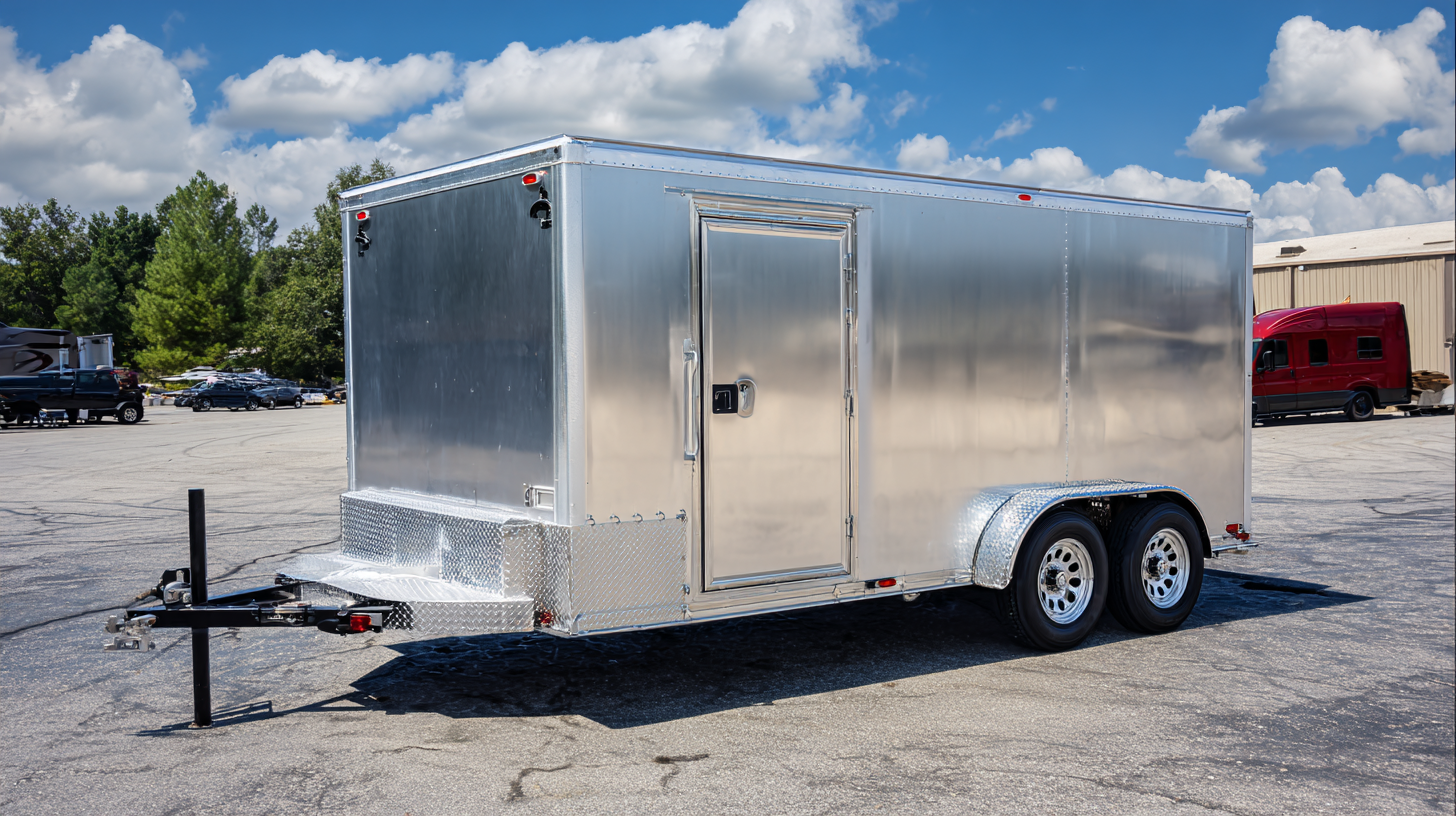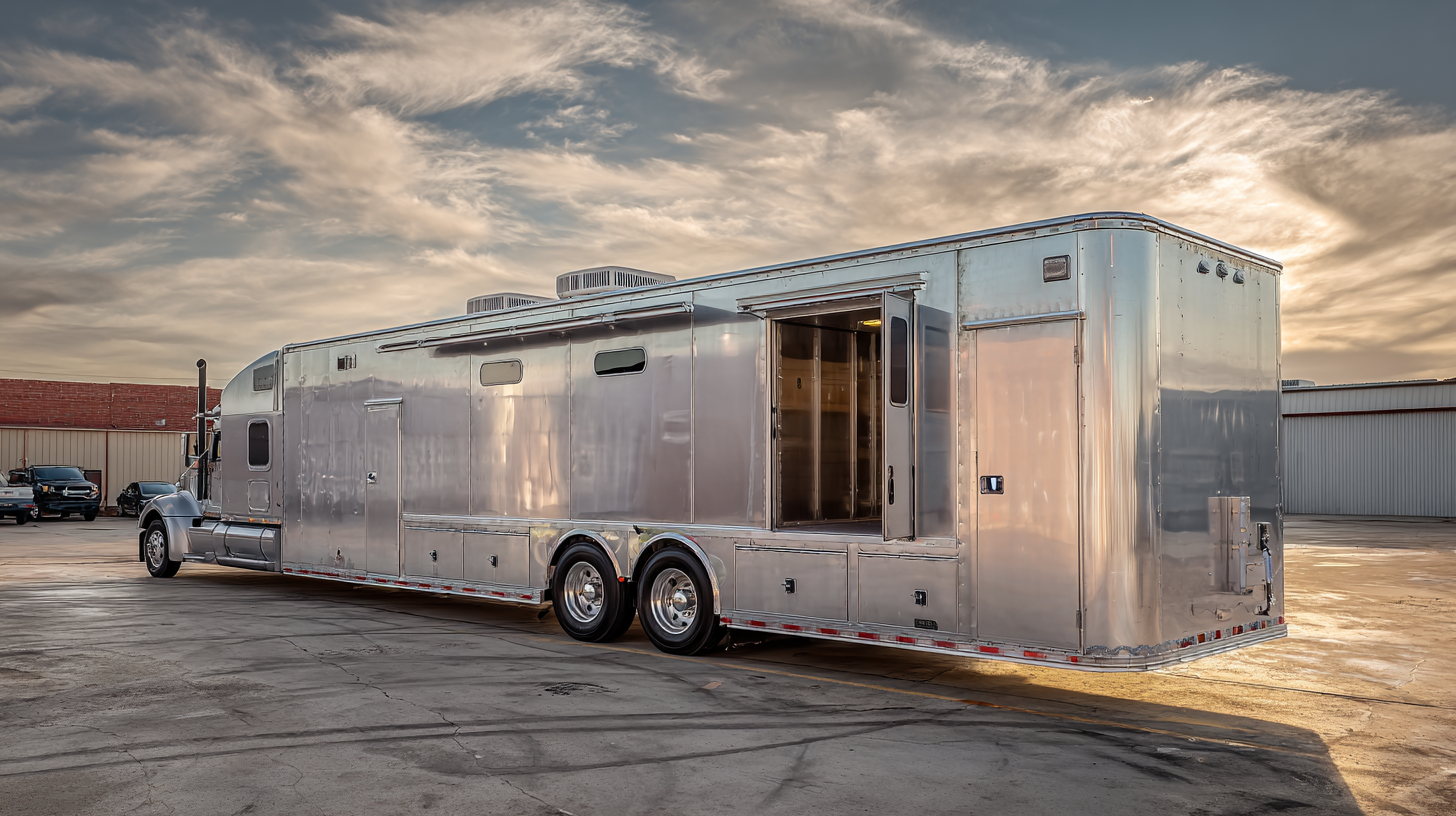Unlocking Advantages: Why the Best Aluminum Trailers Lead the Market in Durability and Performance
In the competitive world of transportation and hauling, aluminum trailers have emerged as a leading choice for both professional and recreational users. Their lightweight yet durable design offers unparalleled performance, making them an ideal solution for various applications. However, the true advantage of aluminum trailers goes beyond their initial appeal; it also encompasses exceptional after-sales service and lower maintenance costs over time. Understanding how the durability and performance of these trailers translate into long-term savings and reliability is essential for consumers seeking the best investment. This blog will explore the key benefits of aluminum trailers, emphasizing how their robust construction not only meets demanding performance standards but also simplifies maintenance and service, ensuring a smooth ownership experience. Whether you are a seasoned hauler or new to the game, gaining insights into the advantages of aluminum trailers can unlock significant value for your transportation needs.

Key Features of High-Quality Aluminum Trailers for Enhanced Durability
When it comes to aluminum trailers, the superior durability and performance they offer cannot be overlooked. High-quality aluminum trailers are designed with specific features that enhance their longevity, making them an ideal choice for various industries such as agriculture, construction, and marine applications. Key attributes include a corrosion-resistant exterior that withstands harsh weather conditions, lightweight construction for better fuel efficiency, and reinforced frames for added strength during heavy loads.
Tips for maintaining your aluminum trailer include:
- Regular inspections to check for signs of wear and tear
- Ensuring that all joints and connections are secure
- Cleaning the surface periodically to prevent dirt buildup that can lead to corrosion
Additionally, investing in high-quality components, such as heavy-duty axles and wheels, can significantly boost performance and reliability. These improvements not only extend the trailer's lifespan but also enhance its overall functionality, ensuring it meets the demands of any job effectively.

Comparing Aluminum Trailers to Traditional Steel Options: The Performance Edge
When evaluating the performance of aluminum trailers versus traditional steel options, the advantages of aluminum quickly become apparent. According to a report by the National Association of Trailer Manufacturers (NATM), aluminum trailers can be up to 30% lighter than their steel counterparts. This lightweight design translates to improved fuel efficiency during transportation, ultimately lowering operational costs for users. Additionally, the increased strength-to-weight ratio offered by aluminum allows for higher payload capacities without sacrificing stability.
Durability is another critical factor to consider. Aluminum trailers are naturally resistant to rust and corrosion, which is a common problem faced by steel trailers exposed to harsh weather conditions. A study by the Aluminum Association highlights that aluminum trailers can last up to 50% longer than traditional steel options when appropriately maintained. This longevity not only enhances the lifecycle of the trailer but also adds significant value, demonstrating that investing in high-quality aluminum trailers can lead to fewer replacements and lower maintenance expenses in the long run.

Maintenance Tips to Maximize the Lifespan of Your Aluminum Trailer
When it comes to maximizing the lifespan of your aluminum trailer, regular maintenance is key. Just like preparing a solar battery bank for winter involves thoughtful strategies, maintaining your aluminum trailer during the off-season will ensure it remains durable and performs optimally. Regular checks on the trailer's frame and surfaces can help identify any potential issues before they escalate. Cleaning the trailer regularly to remove dirt, salt, and grime is essential, as these elements can lead to corrosion over time.
Additionally, just as a depth of discharge is crucial in battery management, monitoring the weight and load capacity of your trailer is important for maintaining its structure. Avoid exceeding recommended weight limits, as this can significantly affect durability and performance. Furthermore, applying a protective sealant periodically will help guard against wear and tear, extending the life of the trailer. By adopting these maintenance tips, you can ensure that your aluminum trailer remains a reliable asset for many years to come.
Innovative Design Elements That Set Premium Aluminum Trailers Apart
In the competitive realm of aluminum trailers, innovative design elements are what set premium models apart from the rest. Recent trends in trailer designs reflect a burgeoning focus on combining functionality with aesthetic appeal. As seen in the latest luxury travel trailers, features such as spacious living areas and multifunctional layouts are becoming standard. High-quality materials not only enhance durability but also improve the overall performance of these trailers, making them more appealing to outdoor enthusiasts and travelers alike.
For instance, advancements in lightweight construction techniques allow manufacturers to reduce the weight of trailers without compromising strength. This innovation contributes to better fuel efficiency and easier towing experiences. Additionally, cutting-edge design aspects, such as optimized aerodynamics and technologically integrated smart features, ensure that modern aluminum trailers meet the growing demands of discerning customers. As the market evolves, it's clear that the best aluminum trailers are not merely vehicles; they embody a lifestyle that values durability, performance, and unparalleled comfort.
Unlocking Advantages: Why the Best Aluminum Trailers Lead the Market in Durability and Performance - Innovative Design Elements That Set Premium Aluminum Trailers Apart
| Feature | Premium Aluminum Trailer | Standard Aluminum Trailer |
|---|---|---|
| Weight | Lightweight: 1,200 lbs | Heavier: 1,500 lbs |
| Load Capacity | 3,000 lbs | 2,500 lbs |
| Corrosion Resistance | High | Moderate |
| Frame Design | Integrated Dual Axles | Single Axle |
| Resale Value | High | Moderate |
| Warranty Period | 5 years | 1 year |
| Innovative Features | Ramps with Non-Slip Surface | Standard Ramps |
Real-World Applications: Why Professionals Prefer Aluminum Trailers for Heavy-Duty Use
Aluminum trailers have become the preferred choice for professionals in various heavy-duty industries, including construction, agriculture, and transportation. According to a report by the National Association of Trailer Manufacturers, aluminum trailers are known to withstand extreme weather conditions and resist corrosion better than their steel counterparts. This durability is crucial for professionals who rely on their equipment to perform well in rugged environments. With a typical lifespan of over 20 years, aluminum trailers not only offer longevity but also lower maintenance costs, as they do not require regular rust treatments.
Furthermore, professionals appreciate the lightweight nature of aluminum trailers, which can reduce fuel consumption when towing. A study from the American Trucking Association indicated that lighter trailers can improve fuel efficiency by up to 15%, translating to significant cost savings in logistics and transportation operations. Additionally, the enhanced payload capacity that comes with lighter trailers enables professionals to transport more materials or equipment in a single trip, thereby increasing overall productivity. These advantages underscore why aluminum trailers have become the go-to choice for those demanding performance and reliability in heavy-duty applications.
